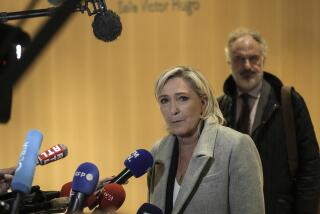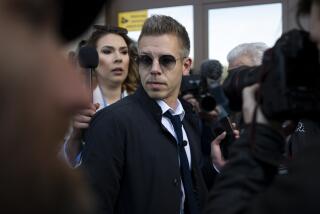Fresh Taint Fogs French Leadership
- Share via
PARIS — Just at a time when French politics was starting to seem free of the endemic sleaze of recent years, a new scandal has exploded with such force and unpleasantness that one newspaper has likened it to a stink bomb.
The result has been undeclared war between President Jacques Chirac and Prime Minister Lionel Jospin, and damage to the reputations of politicians on both left and right. When one of Jospin’s ministers went on a press-the-flesh walk in Lyons, some onlookers jeered that “all politicians are corrupt.”
Early elections have now become inevitable, some believe.
The genesis was a videocassette made by a covert financier of Chirac’s center-right party. The text of the tape was made public in the daily Le Monde last week. On tape, financier Jean-Claude Mery, who died in 1999, claimed that Chirac, while mayor of Paris, masterminded a vast party slush fund fed by kickbacks from companies awarded municipal contracts.
According to Mery, he once opened a briefcase containing $670,000 in cash in Chirac’s presence while the president was still mayor of Paris.
It will surprise few in France that for years, the capital’s City Hall served as a hive for secret financing and fictitious jobs for officials in Chirac’s Rally for the Republic party. But Mery’s accusations were the most detailed and sensational yet against Chirac himself.
France’s head of state angrily denounced the accusations as an “abracadabra tale” spun for political motives, and his entourage denounced an operation of “manipulation” by the Socialists.
The next shock concerned the source of the tape. It turned out that the original had been in the hands of Dominique Strauss-Kahn, a longtime friend of Jospin and a prominent Socialist politician. According to accounts that surfaced in the media, a tax lawyer might have given Strauss-Kahn the tape while he was finance minister in exchange for going easy on couturier Karl Lagerfeld’s bill for back taxes. Strauss-Kahn and Lagerfeld denied there was any such deal, and the former minister claimed he never even watched the tape.
Denials notwithstanding, many French have been disgusted by what seems to be a story of corruption and political dirty tricks without heroes. A poll in the daily Le Parisien published Thursday found that 67% of respondents believed that the scandal had besmirched the image of French politicians in general. The damage done to Strauss-Kahn’s reputation, the poll found, was greater than that to Chirac’s.
The scandal--or l’affaire, as the French say--has poisoned the usually stiff but courteous relations between Chirac and Jospin as each mobilizes his camp to attack the other. Presidential and parliamentary elections are due in 2002, but some here believe that is too long to wait if the atmosphere doesn’t improve.
“An early presidential election and the resignation of the government are what’s needed to relieve our disgust,” the newsmagazine L’Express editorialized this week.
“We are the fourth-largest power in the world, and we are reduced to holding debates that are totally humiliating and degrading for all politicians and for our democracy,” lamented Patrick Devidjian, spokesman for Chirac’s party.
Devidjian tentatively floated the idea of a blanket amnesty for party finance violations, a notion that may have come from Chirac himself, but the Socialists, furious at the efforts of the president’s camp to turn them into the villains of the piece, flatly refused.
“It’s very important that justice be done for everybody,” said Jospin’s justice minister, Elisabeth Guigou.
Meanwhile, the hunt goes on for the original of Mery’s video. Magistrates have searched the home and offices of Strauss-Kahn, who says he can’t remember what he did with it.
More startling revelations may lie ahead, but already many of the French have decided that they don’t want any more of Chirac or Jospin. In January, a poll found that 46% of voters were looking forward to a matchup between the incumbent president and prime minister in the next presidential election. That number has now fallen to 30%.
More to Read
Sign up for Essential California
The most important California stories and recommendations in your inbox every morning.
You may occasionally receive promotional content from the Los Angeles Times.













